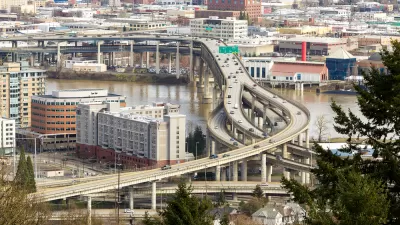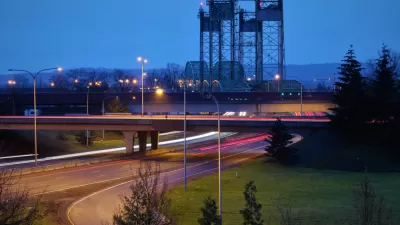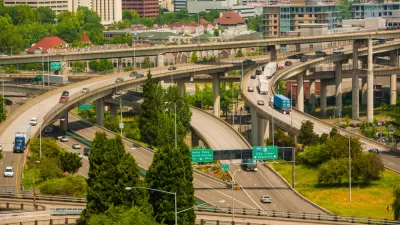The state that implemented the first gas tax and the first bike tax took a huge step on Thursday toward becoming the first, since 1956, to toll all lanes on an interstate highway by approving an application to the Federal Highway Administration.

"The Oregon Transportation Commission voted Thursday [Dec. 6] to approve the state’s application to the federal government to consider tolling on portions of Interstate 5 and Interstate 205 in Portland," reports Andy Matarrese for the Vancouver, Washington-based Columbian.
Federal law governs when tolling is allowed, especially for interstate highways. The law typically allows tolls on interstates for repairing or replacing bridges, tolling in a new lane, or turning a carpool lane into a toll lane, according to the Oregon Department of Transportation (ODOT).
Oregon is asking the Federal Highway Administration (FHWA) for authority to toll existing lanes under a federal pilot program for value pricing tolling.
The commission was enacting landmark transportation funding legislation, House Bill 2017 that hiked gas taxes by 10 cents per gallon, approved in July 2017. Thursday's vote was the culmination of the work by the Portland Metro Area Value Pricing Policy Advisory Committee which has received public input from the region on the congestion-reduction project since Nov. 20, 2017 [pdf]. The first recommendations were received last May.
The state’s application essentially asks the highway administration for its OK to proceed. The state wants to confirm whether the tolling plan would be eligible under federal tolling program rules, and is also asking for guidance on how it will have to proceed with environmental impact reviews.
"Congestion in this area is creating problems in our quality of life and damaging our economic advantage,” said Tammy Baney, the Commission chair in a press release on the historic 5–0 vote that identifies the general locations on the two roads for tolling, and how revenues may be used.
“This is why we’re looking at the possibility of tolling to manage congestion and generate additional revenue. We need options and tools and this is one.”
Tolling will not "flat" like the nation's newest toll road outside Charlotte, N.C. Instead, it will be "value-priced" to manage demand on the roadways.
Next steps
If the application is approved, the commission will commence work on the specifics of the project, which have yet to be worked out.
According to ODOT, the application asks the FHWA to "clarify and confirm three critical next steps in the process:"
- Which of the several federal tolling programs are appropriate for Oregon’s plans.
- The nature of the analysis and project development needed under the National Environmental Policy Act (NEPA), a necessary part of the process.
- An estimate of the timeline needed for NEPA review.
Roadblocks ahead
However, it is not just the federal government that will determine whether the two stretches of freeways become tollways, as political hurdles emerged during the outreach process:
- State voters may have the ultimate say in whether tolling is applied, or how it is applied, should Initiative Petition 10 qualify for the 2020 ballot.
- Interference could come from Gov. Jay Inslee (D-Wash.), a climate warrior who has become protectionist when it comes to subjecting Washington state residents, mostly those living in Vancouver and Clark County, to the new tolls.
Another challenge from the Evergreen State is posed by U.S. Rep. Jaime Herrera Beutler, R-Battle Ground, who views the value pricing proposal as a "cash grab" by Oregon, reports Matarrese.
“Oregon knows revenue can be collected at those spots without any political recourse from Southwest Washington residents who have no vote in the matter, which is why it continues to barrel ahead without presenting any kind of plan to improve the infrastructure that most Southwest Washingtonians actually use,” she said in a statement.
State and local leaders will need to consider the impacts on neighborhoods as well, particularly from "cut-through" traffic seeking to avoid the tolls depending upon their location, which may conflict with concerns of Washington state residents, reports Andrew Theen for The Oregonian.
Chris Trejbal from North Portland’s Overlook Neighborhood Association said he was concerned the state was bowing to political pressure from Washington politicians and commuters who balk at the toll being placed at the border between the two states.
A fourth 'first'?
Should the state surmount all the hurdles and, many years from now actually toll all the lanes on the two stretches of interstate highways, it will have achieved the fourth "first" in state transportation funding after enacting:
- The nation's first gas tax in 1919.
- The nation's first actual road usage charge, aka vehicle-miles traveled fee, program in July 2015, although ODOT is a limited, voluntary program. Pilot programs [pdf] were launched in 2007 and 2013.
- The nation's first bike tax this year.
- Advisory Committee Recommends Complete Tolling of Portland Interstates, July 9
- Priced Lane or Priced Roadway? May 17
-
Analysis Debunks Equity Criticism of Congestion Pricing, Oct. 24, 2017: Oregon's recently approved gas tax legislation that calls for tolling of I-205 and I-5 has raised equity concerns.
FULL STORY: Oregon transportation board submits I-5, I-205 tolling plan application to feds

Maui's Vacation Rental Debate Turns Ugly
Verbal attacks, misinformation campaigns and fistfights plague a high-stakes debate to convert thousands of vacation rentals into long-term housing.

Planetizen Federal Action Tracker
A weekly monitor of how Trump’s orders and actions are impacting planners and planning in America.

In Urban Planning, AI Prompting Could be the New Design Thinking
Creativity has long been key to great urban design. What if we see AI as our new creative partner?

How Trump's HUD Budget Proposal Would Harm Homelessness Response
Experts say the change to the HUD budget would make it more difficult to identify people who are homeless and connect them with services, and to prevent homelessness.

The Vast Potential of the Right-of-Way
One writer argues that the space between two building faces is the most important element of the built environment.

Florida Seniors Face Rising Homelessness Risk
High housing costs are pushing more seniors, many of them on a fixed income, into homelessness.
Urban Design for Planners 1: Software Tools
This six-course series explores essential urban design concepts using open source software and equips planners with the tools they need to participate fully in the urban design process.
Planning for Universal Design
Learn the tools for implementing Universal Design in planning regulations.
Gallatin County Department of Planning & Community Development
Heyer Gruel & Associates PA
JM Goldson LLC
City of Camden Redevelopment Agency
City of Astoria
Transportation Research & Education Center (TREC) at Portland State University
Jefferson Parish Government
Camden Redevelopment Agency
City of Claremont





























